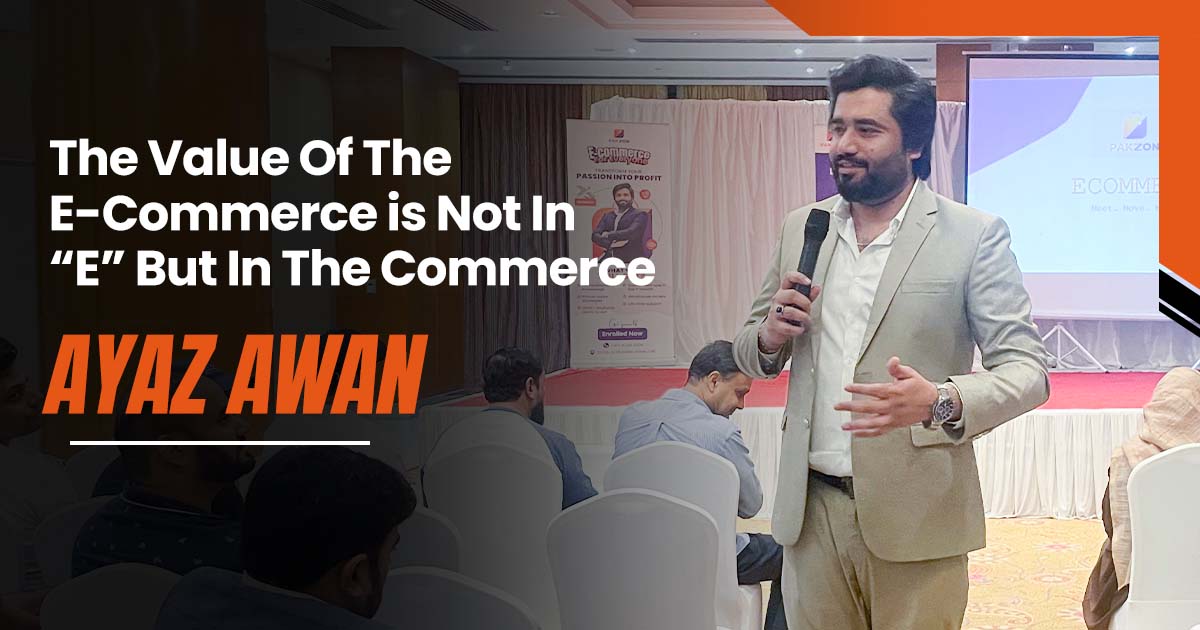
An era dominated by digital transactions and online shopping makes it very easy to become caught up in the enabling technology for e-commerce. Ayaz Awan, a seasoned e-commerce expert, challenges this common perspective with a powerful assertion: the real value of e-commerce isn’t found in the “E” or electronic component but in the foundational principles of commerce itself. This blog post explores why focusing on traditional commercial strategies is crucial for succeeding in the digital marketplace.
Understanding the complete scope of e-commerce thus requires a shift in focus from the technological to the commercial roots. While the digital tools and the platforms may be necessary, these represent merely facilitators of the underlying commerce. Emphasizing the commerce part of e-commerce enables an enterprise to rely on new technologies and timeless principles of selling in order to grow indefinitely and make customers glad.
Understanding E-Commerce
In simple terms, e-commerce refers to buying and selling of goods and services via the Internet. Over the last two decades, it has evolved from being a novel idea to being an important ingredient in modern retailing. This change in trend not only reshaped consumer behavior but also transformed the way businesses operate globally, offering unprecedented convenience and scalability.
However, with this shift to online platforms, many businesses mistakenly prioritize technological innovation above traditional commerce strategies. And even though keeping updated with the latest technology is essential, the core of e-commerce success lies in how a business can blend these tools with its core commercial practices. This integration is what makes thriving e-commerce operations and derailed ones differ.
Related: Turning Online Businesses From Zero to Hero
The Fallacy of “E”
The ‘E’ in e-commerce stands for ‘electronic’, and hence widely creates a flag that grabs attention to the technological features of electronic trading. Technology then becomes the main player in this online business, resulting in often wrong assumptions that technology alone can suffice for success in the electronic marketplace. This perspective sometimes fails businesses in noting proper commercial principles such as customer relationship management and product quality.
By focusing too much on the electronic aspect of business, these firms often overlook human factors in the hub of commerce. Customer service and personal interaction are often what differentiate successful businesses from failed ones. Technology must be supplemental to these factors, not a replacement for them so that commerce is at the center of any e-commerce enterprise.
Main Aspects of Commerce in E-Commerce
Commerce at its essence is about understanding market needs, delivering quality products and relating effectively with customers, which all apply in the real world as much as they do in the virtual world. In e-commerce, these principles must be adapted to the new environment but could never be forgotten. From these fundamentals, effective e-commerce builds: linking digital tools together for improved operational efficiencies and higher customer satisfaction.
For instance, an e-commerce business will utilize analytics to not only track sales but understand in-depth the preferences of customers and their behavior. This can then be used to guide everything from inventory management to personalized marketing campaigns, all very much aligned with traditional commerce strategies but in a digital framework.
Lessons from Ayaz Awan
Ayaz Awan has often articulated that the traditional techniques of commerce should not be separated from modern e-commerce platforms. He believes that the application of digital tools should only improve, not supplant, the core business structure. “The most successful e-commerce businesses,” Awan points out, “are those that use technology to amplify their commercial strengths, not overshadow them.”
From Awan’s teachings, it’s evident that e-commerce is about more than mere virtual existence-there’s more to making meaningful connections with the customers and delivering great services, as in the case of old commerce. His ideas motivate businesses to delve deeper into the façade of the digital world into a deep understanding of the core elements of commerce that can be used to build a more sustainable online enterprise.
Related: Global Marketing Mastery With Ayaz Awan
Strategies that Emphasize Commerce in E-Commerce
True success in the digital marketplace means an approach that extends beyond technology. It calls for a customer-centered approach, where the ultimate goal of selling is to ensure customer satisfaction by meeting their experiences. Businesses must use e-commerce platforms to make customer journeys easy from interest creation to follow-up after sale.
Furthermore, the integration of sound logistics and supply chain management would serve to support the reliability and quality of service that customers expect. These would be key areas in managing increased scope and scale in e-commerce, ensuring businesses meet delivery promises and ensure product quality, hence reinforcing the traditional values of commerce-relationship with reliability and customer trust.
Conclusion
In conclusion, while e-commerce has revolutionized the way we shop and sell, its success still hinges on basic commercial principles. As Ayaz Awan rightly points out, the “E” is just a means to an end—the true value lies in commerce. Businesses that recognize and implement this can not only survive but thrive in the competitive digital marketplace.
Focusing on the commercial aspect instead of the merely electronic can be a good way for businesses to use both the power of technology and the strength of traditional commerce strategies to create a robust, customer-focused online presence. Therefore, the future of e-commerce lies not in abandoning the tried and true but in creatively integrating it with the new.
For e-commerce businesses looking to succeed, the key is to remember that technology is a tool, not a solution. Consider revisiting your business strategy to ensure it aligns with core commercial principles. For more insights on integrating commerce into your e-commerce strategy, join our upcoming webinar with Ayaz Awan, where he will delve deeper into how traditional commerce can power the new age of digital sales.





Leave A Comment